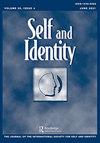身份迷失与发现:社交网站语境中的自我概念清晰
IF 2.1
4区 心理学
Q3 PSYCHOLOGY, SOCIAL
引用次数: 4
摘要
摘要社交网站允许年轻人在自我概念发展的重要时期尝试并展示自己的不同方面。有趣的是,SNS对自我概念清晰度(SCC)的影响是消极的还是积极的还没有定论。我们认为,社交网络的使用可能同时对SCC产生负面和正面影响,这取决于人们如何使用社交网络以及在线创建的社交连接质量。具体而言,抑制中介模型显示,社交网络使用强度对SCC的直接影响是负面的,而通过感知社会支持和自尊的间接影响是正面的,这表明这些变量可能会抑制社交网络使用对SCC的负面影响。我们的框架有助于解释社交网络环境如何影响年轻人的身份发展。本文章由计算机程序翻译,如有差异,请以英文原文为准。
Identity lost and found: Self-concept clarity in social network site contexts
ABSTRACT Social network sites (SNSs) allow young people to experiment with and present different aspects of themselves during important periods of self-concept development. Interestingly, whether SNSs have negative or positive effects on self-concept clarity (SCC) is inconclusive. We propose that SNS use may simultaneously produce negative and positive effects on SCC, depending on how people use it and the social connection quality created on-line. Specifically, the suppressing mediation model reveals that the direct effect of SNS use intensity on SCC is negative, whereas the indirect effects via perceived social support and self-esteem are positive, suggesting these variables may suppress the negative effect of SNS use on SCC. Our framework helps to explain how SNS contexts influence identity development in young people.
求助全文
通过发布文献求助,成功后即可免费获取论文全文。
去求助
来源期刊

Self and Identity
PSYCHOLOGY, SOCIAL-
CiteScore
5.10
自引率
5.00%
发文量
26
期刊介绍:
Work on self and identity has a special place in the study of human nature, as self-concerns are arguably at the center of individuals" striving for well-being and for making sense of one"s life. Life goals develop and are influenced by one"s view of what one is like, the way one would ideally like to be (or would like to avoid being), as well as one"s perceptions of what is feasible. Furthermore, conceptions of self and the world affect how one"s progress towards these goals is monitored, evaluated, redirected, re-evaluated, and pursued again. Thus, the “self” as a construct has far-reaching implications for behavior, self-esteem, motivation, experience of emotions and the world more broadly, and hence for interpersonal relationships, society, and culture.
 求助内容:
求助内容: 应助结果提醒方式:
应助结果提醒方式:


